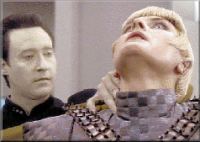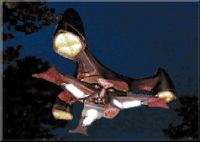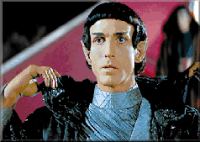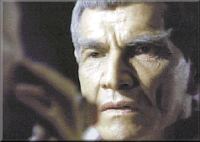Physiology
Vulcans comprise of nearly one third of the Federation population at 21 billion. This and their long-standing membership in the Federation makes their physiology among one of the most studied, and certainly best documented species other than the human body. Differentiating Terran humans from Vulcans is as easy as looking for the ubiquitous pointed ears and converging eyebrows, their most visible attributes. The Vulcans' great physical strength and endurance come from living in the thin atmosphere and harsh conditions of Vulcan. In order to survive such an inhospitable environment, they have developed specialized organs over millennia of time.
Senses The surface of Vulcan is a barren land of formidable dangers: radiation, heat, and dust that result from the combination of dry climate and the two suns Vulcan orbits. To simply survive this deterring environment, Vulcan eyes have a clear second eyelid or nictating membrane that filters out dangerous substances from entering the sensory organ. Vulcan eyes observe lower frequency bandwidth of light compared to Terran humans, shifting to the infrared spectrum.
Their nose is highly efficient at filtering breathable oxygen into the lung, but their olfactory sense is extremely compromised as a result. Vulcan ears are shown to be capable of intensifying sound waves in dry conditions.
Internal Organs Vulcan organs have also specialized to adapt to Vulcan conditions. Their lungs are larger than humans, the alveoli 75% more elastic and efficient at the exchange of gases. To make room for the lungs, Vulcan hearts are located where human liver is found, and as a result the protective rib cage extends some 3.5 cm lower to accommodate the heart. Beating at 232 times per minute, the heart must necessarily be more muscular and elastic to
carry out the heavy workload. The circulated blood is copper based, the reason for the green coloration of Vulcan blood, rather than human iron based corpuscles. This and the biconvex surface of a single Vulcan blood corpuscle allows for continued circulation in low-atmospheric pressure situations. Another organ which is vital to survival for Vulcans are the kidneys and excretory systems function with absolute efficiency to retain water and nutrients which pass through.
Vulcan hormonal glands are ductless and completely voluntary, which gives them control of the conditioning of their body, but the only glands that cannot be regulated are ones related to reproduction. In ancient times, Vulcans males battled each other for their mates, causing unnecessary bloodshed and hindering the growth of society. With the introduction of the new way of life, Vulcans suppressed their lust. However, every seven years, the cumulative effects of all the years of logic gives way to an overwhelming instinct to mate, and Vulcan males at this time must mate or die. It is pon far, possibly the last remnant of the survival instinct left in Vulcan society.

Psionic Skills
Vulcans repelled their first hostile alien invaders using their innate psionic powers. This ability allows mind-melding with sentient life and some reports indicate a capability for telekinesis. The source of this power lies within the Vulcan brain. Though similar overall in structure and size (1600 cc) to that of Terran brain, the midbrain area, where telepathic and telekinetic powers originate, is significantly different. Larger and more convoluted than the Terran midbrain, the extended capabilities of the Vulcan midbrain fosters the psionic powers of the people.
At long range, psionic abilities are extremely limited. A Vulcan can sense the presence and perhaps species of minds, but he cannot sense much regarding direction or identity. Some specialized disciplines focus this, so that the user can analyze in a given direction, up to a maximum of 5-10 meters.
At the level of Mind Touch, surface thoughts can be exchanged and manipulated. Surface thoughts are easily read and communicated. A skilled practitioner can plant suggestions or confuse his target.
The Mind Meld level is what the Vulcans consider to be the most deeply shared intimacy possible. The telepathic meld combines the consciousness of the two beings, and all thought, feelings, and wisdom can be shared in this way.

Society
Vulcans are pacifists by and large, a condition that is dictated by their logical tendencies. The government on present day Vulcan is a representative democracy, whose three branches are "hr'Mnah'te" (the proposal group), the "hr'Breish'te" (the rectification group) and the "hr'Kash'te" (the expunging group). Vulcan government tends towards laissez faire, and the law system is designed to make laws easier to rescind than implement. For an intensely logical race, the Vulcans do have a very firm spiritual belief. Though there is no one unifying religion, the Vulcans believe in the katra, the sould and consciousness of a person, which is transferred psionically just prior to death. Vulcan beliefs are monotheistic because the presence of a creator is stressed in their ideals.
The spiritual leader of Vulcans is a high-priestess who presides over the homeworld.
Aided and restrained by centuries-old philosophy and techniques, Vulcans are a race of adept telepaths. Wherever a Vulcan may have been brought up, most return to Vulcan for rigid training which develops their concentration, meditation, and telepathic abilities. There are a number of psionic institutions, called Sohk-Paks or "schools of the mind". The first great Sohk-Pak was supposedly founded by Sorinak 7200 years ago. Besides these psionic training, some non-telepathic training allows concentration of strength, blood and antibodies into injured organs in self-induced hypnosis when wounded, which accelerates regeneration to an astonishing speed.
Vulcans have chosen mates by the age of seven, selected by their parents, the mates are joined in a ceremony that links them telepathically. When the two come of age, the link compels them to follow through with full marital rituals, which cement their relationship. The total disengagement of emotions Vulcans adopt must be relieved every seven years, in what is known as pon farr. Vulcan males must mate, and the natural choice is of course their chosen mate. For such an orderly society of quiet sobriety, the madness and outbreak during pon farr is the unavoidable evil.

The essence of their logical society is in arriving at the truth through logical process. Emotion is illogical, thus making them impure, and deterrent to truth. However, Vulcans are born with the same emotions that afflicted their violent ancestors, but the continual mind conditioning, the t'an s'at, gives them the impassivity sought after by all Vulcans. The t'an s'at is an intellectual decontruction of emotional patterns, a lifelong process that strives for absolute detachment from all emotion. Though not all can arrive at the penultimate pure logical state, the exacting process of mental control gives Vulcans enough to conform to the ideals of Vulcan society. Vulcans of this creed are impervious to greed, deception, anger, and all other vices that still plague the Terran psyche well into the 24th century.
Vulcans believe knowledge to be the only defense against unknown dangers, and pursue them with the intellect and logic that makes them some of the finest scholars in the Federation. Their pursuit of knowledge and impassivity of emotion are the driving forces in a Vulcan's life.
"Logic is the cement of our civilization with which we ascend from chaos using reason as our guide." - T'Plana'hath
Vulcan History
Vulcan a millennia before the the Romulan colonization party left was warlike and dangerous for the weak. Resources on the dry world were far too sparse for peaceful coexistence of all its people. It was the constant struggle for survival that made early Vulcans violent, emotional, and fiercely clannish. Each of the hundreds of small clans and city-states on the planet surface had diverse governmental structures and religions, and they constantly battled each other over possession of resources and water on the planet. It is estimated that at any one time, 90% of the planet was at war.
The wages of war tired some Vulcans, who after endless battle wondered if peace might not be a better way of life. The leader of this movement was Surak, who spread his philosophies of logic and pacifism to the warring Vulcans. Though slow to gain momentum, Surak ultimately succeeded in converting a core of Vulcans to his cause, among them S'Task, one of his finest pupils. Surak is revered as the founder of modern Vulcan society to this day.

Vulcans came into first contact with alien life in Terran years B.C. 20. Vulcans first received messages from outside their planet, and the realization of alien life so stunned the planet that a total cease-fire was declared until they dealt with this matter. The message was decoded through some mathematics and revealed messages overtly friendly and promising. The aliens promised lucrative trade and peaceful contact. In good faith the Vulcan planetary government decided to send emissaries and meet with these aliens.
Surak was delayed by mechanical failure in his shuttle, and S'Task was sent instead on the ambassadorial convoy assigned to greet the alien visitors. They turned out to be Etoshan and Duthuliv pirates, interstellar criminals who preyed on cultures without interstellar travel. The pirates captured the good-will ambassadors, killing anyone who resisted. A large portion of the leadership of Vulcan was imprisoned and held for ransom, S'Task among them.
Vulcan had enough pride to refuse extortion and soon was plunged into total war with the pirates. This is known as the "Ahkh," the war that united all of Vulcan in facing a common enemy. Though their technology was primitive, the innate psionic abilities of Vulcans helped them overwhelm the aliens, who found themselves attacking each other and piloting their ships into the Vulcan suns. It wasn't long before the Orion pilots made a hasty retreat and left the planet they should never have made designs upon.
Even while the war raged on, Surak firmly held to his principle of peace and offered a peaceful resolution with the Orion invaders. S'Task, however, was not willing to let his life be decided by the words of an untrustworthy Alien and led a rebellion on his slave ship, killing hundreds of his captors and releasing the imprisoned Vulcans. At great risk to his life, he then rammed the liberated vessel into the Orion mothership, killing thousands of pirates. He was found many weeks later in an escape pod, drifting in space, half-starved and nearly dead.
He returned to Vulcan a hero, but Surak did not appreciate his heroics and chided him for having resorted to violence. After this encounter with the hostile world, S'Task realized the universe was too violent and unpredictable to deal through logic and peace alone, and he could no longer follow his teacher's philosophies.
This split between teacher and student deepened into a great fissure in Vulcan society.
S'Task believed strength alone could ensure a protected future for Vulcan, but Surak and the vast majority of the society followed the principles of logic. Knowing they were outnumbered, S'Task and some eighty thousand followers left Vulcan to start anew on another world.
The differences between S'Task and Surak would never be resolved once the ships left Vulcan. The self-annointed Rihannsu breakaway group settled in distant worlds and became known as the Romulans to the Federation. When Vulcan joined the Federation, the memory of S'Task and his group of renegades had faded into history, so the discovery of Romulans as the distant relatives of Vulcans startled both sides. Romulan forces grew swiftly after first contact with Federation ships, and soon became menaces of the Alpha Quadrant until a neutral zone was set up.

Though the practice of logic and truth is quintessentially Vulcan. It is just a Vulcan, Valeris, who worked as an operative that disrupted the landmark Khitomer peace conference. Factions within the Federation worried that peace between the Klingons and the Federation at Camp Khitomer would compromise the stability of the Alpha Quadrant. In the future, the Khitomer Conference of 2293 would be seen as the single most important peace accord in Federation history. Valeris repeatedly lied to cover up evidence of her involvement in the sabotage of the peace conference, and only after a mindmeld did Spock forced the truth out of his traitorous protege.
Another deviant from the Vulcan mind-set is Sokona, who converted to the Maquis cause and supplied illegal weapons to the Federation terrorists. Her reasoning is that it is logical to support the remaining colonists inside Cardassian territory, even if that meant violence.
Lt. Commander Tuvok of the U.S.S. Voyager is a an interesting distinction from known Vulcans seen before his time. His choice of security officer is singularly unusual, since all other Starfleet Vulcans are either in command or the sciences. It is not unlikely that even on Vulcan, some things change.
Unification The deep split between Romulans and Vulcans has never been repaired, but of late, Ambassador Spock has worked in the underground of Romulus for a reunification of Romulans and Vulcans, and the day may come when full reconciliation between the split brothers usher in a new era of understanding and cooperation.
|




